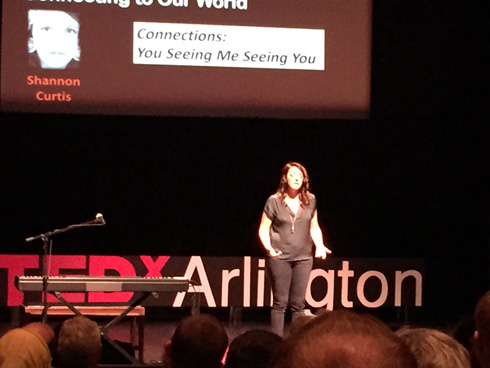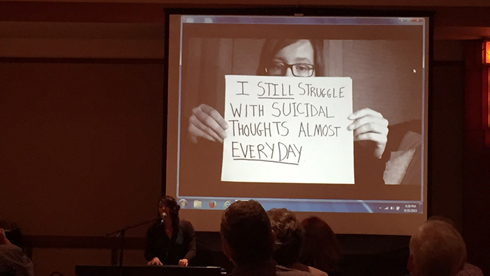We’re in Arlington, VA this weekend … because Shannon is giving her first TED talk! It should be online in a few weeks … I’ll post it when it’s up.

DBSA conference
We got home from a 3-month tour two nights ago … and last night we got on a plane with all our stuff and headed right back out. No rest for the wicked! Today we’re in the western Chicago suburbs, where Shannon is performing and we’re manning a table at the annual conference for the Depression & Bipolar Support Alliance. If you are struggling with one of those issues in your life, CHECK THE DBSA OUT. They facilitate community-focused peer support networks, and they’ve been doing it for a long time with a record of success. We’re beyond honored to be here.

on tour
I’m on tour with my sweetie. Check here for dates; if we’re going to be in your area and you want to come to a show, email me and we’ll see if we can get you hooked up with an invite. I’ll be back to normal on here in October. Have a great summer!
get it out there
As an independent producer/engineer, I work in a lot of different capacities on a lot of different types of projects. Sometimes I’m just putting a mix on something someone else has recorded, and sometimes I’m intimately involved with every aspect of a project from initial demos through to mastering. Most projects fall somewhere between those two extremes, and as such I’ve gotten to work with a lot of different types of artists.
I’m currently working with an artist who’s been working on the same record on and off for close to three years. We’ve spent well north of a thousand hours on this project over that period of time. We’ve produced the record once, completely remixed it twice, and are currently on our second round of mastering. It’s an epic project, sort of insanely so.
(I want to take a sidebar here to say that, in this very specific case, it may actually end up being worth it, because the artist in question is extraordinarily talented, is doing something musically unique, has a tremendous long-term vision, and has raised herself a formidable budget. She wants to debut this body of work at Disney Hall with a 100-person dance troupe, and you know what, she’ll probably pull it off. She’s one in a million.)
But what about the rest of us? What about normal artists, singer-songwriter types, who have written some songs on their acoustic guitar, who don’t have infinite budgets, and who are embarking on making recordings? Is this type of obsessive long-term epic recording project healthy? Is it a good idea to take a long time making and releasing recordings?
I want to make the argument that no, it’s absolutely not. In a recent and somewhat related piece, I talked about how it can be difficult for budding artists/producers to know when a recording is finished. In a computer-powered world of infinite possibilities, it’s all too easy to become paralyzed. What if I change this drum sound? What if that acoustic guitar were an electric guitar? Now what if it were a piano part instead?
You can go in circles. Any song can be recorded and re-recorded in any one of a thousand ways. No recording is going to be the perfect, end-all statement on a particular song. We’ve all heard enough great cover songs to know this to be true. So why on earth should we be obsessing and reworking and exploring every option? It’s so time-consuming. And our time is limited, and should not be wasted.
So I want to use my space here today to encourage you when you’re working on recordings to:
- choose a path,
- go down it as purposefully and efficiently as possible until you’ve finished what you’ve started, and then
- put it out in the world asap and move forward.
This last point deserves a little expanding upon, because I think it’s the most important point here. Your goal as an artist is to tell a story of yourself, and to get that story in front of as many people as possible.To do that, you need to have your work out there, working for you. Every day that you’re revisiting a work in progress is a day that it isn’t out there in the world doing the work you need it to be doing on your behalf, pushing your story forward.
None of us is getting any younger. Time is fleeting. The best time to put out work is when it’s fresh – not just fresh for the world, but fresh for you. Because you’ll be more excited about it, and therefore more enthusiastic about it, and therefore you’ll tell your story in a more compelling way.
Further: I have this idea that the best records are snapshots of where the people who made it were at a particular moment in time. If you take too long working and reworking a record, by the time you put it out, that record may well no longer reflect who you are as a person. And I think there’s a real danger there.
My obsessive friend has devoted three years of her life so far to this record of hers. By the time she puts it out, it’ll probably be closer to four. That’s over 10% of how long she’s been alive. Will the record even still be relevant at that point to who she is as an artist or as a person, four years or more after composing this body of work? I think that as a unique, extreme situation, it’s a good opportunity for some abstract reflection. She’s betting that it’s going to work for her, and I’m taking that bet with her. But I’d also bet that taking four years to make a record won’t work for most people.
Indeed, I’d suggest that for most people, taking any significant amount of time to put out a recording could be a significant impediment, perhaps even a career-killer. Forward momentum is a real thing.
So: make lots of recordings, make them quickly, get them out in the world quickly, and continue to build your story. That’s my thought for the day. Email me if you have thoughts or want to talk about this further …
{ originally published at Pyragraph }
/////
Want to know next time I write something? Sign up here, and I’ll let you know:
[mailchimpsf_form]
six tips for successful self-producing
Recently I wrote an article about how hard it is when you’re self-producing to know when you’re done with a recording. It’s hard! But despair not; in this week’s article, I’m going to offer some ideas on how to make well-produced recordings.
The easy and obvious way to make good recordings is to find a good producer to work with. Good producers have developed a 6th sense that tells them when a recording is working. It’s pretty impossible to communicate – for me it’s sort of like a sensation of something that was itching having been scratched. I assume it’s different for everyone, and similarly nebulous. But if you have one of us working for you, we will let you know when that’s happening for us. That’s a large part of what we’re there for.
But what if you can’t work with a good producer? Well, first of all, hint hint, you can – email me. But let’s say that you don’t have a budget, or you like doing things yourself, or there is some other circumstance that’s precluding you from engaging a professional. What should you do then?
My single biggest piece of advice would be: focus on the song. I know this probably sounds like “duh” when I write it out all straightforward like that, but it’s amazing how many people get all caught up in the process of making a recording and totally lose sight of why they’re making the recording in the first place. Without a song, you’ve got nothing. So put the song at the center of your vision. What does the song need? What are you trying to communicate with this piece of art you’re making? Refer back to this thought constantly and you’ll be in decent shape.
Idea number two: under-produce. Or, to put it another way: when in doubt, go minimal. The single biggest cause of getting stuck and not finishing records is the “It just needs one more thing” trap. All of a sudden you’ve got 40 tracks of acoustic guitars and keyboards and everything’s muddled and nothing’s making any sense. So: why don’t you try to see how few tracks can you use, and still communicate what the song needs to communicate? Again, it’s all about the song.
Idea number three: place artificial constraints on your means of production. Computer recording is a double-edged sword. Its infinite possibilities can be overwhelming. Something that can work wonders is to pretend that you’re working on tape. Limit yourself to 16 or 24 tracks. This will force you to get honest fast about what’s essential to a recording and what’s not.
Idea number four: place artificial constraints on how much time you have to spend on the record. If you have a fixed amount of time in which to work, you’ll be much more focused. Hiring a producer, by the way, is a great way to limit the amount of time you have, as most likely you don’t have infinite money. Although, if you do, email me.
Idea number five: trust your gut, and work quickly. This is another big one. If you can habituate yourself to working quickly, and if you can be critical and continually edit and refine your work as you go, you’ll make good recordings. Period. And you’ll make a lot of them, improving and refining your skills with each successive one.
Idea number six: be you. I see a phenomenon constantly with bedroom producers, in which they compare their work to records made by world-famous people with essentially unlimited resources, and the recordings they’re making don’t stand up. Well of course they don’t! Because it’s not a fair comparison. And that’s OK.
Just do the best you can. It’s seductive to dream about your painstakingly crafted bedroom recordings competing sonically with million-dollar major-label projects. That whole “If only I keep working on this just a little longer” thing. But, let’s be honest – that’s a long shot. So my advice would be for you to set yourself a more realistic goal of making the best recordings you can with the tools and skills you currently have – without setting up unrealistic points of comparison.
So to sum up: 1) make the best recordings you can, that 2) honor your songs as best you can, and 3) do so as quickly as possible. Then get out there and sell some copies of what you’ve made, so that next time around you can make a better recording with the skills you developed while making the last batch. Onward and upward!
{ originally published at Pyragraph }
/////
Want to know next time I write something? Sign up here, and I’ll let you know:
[mailchimpsf_form]